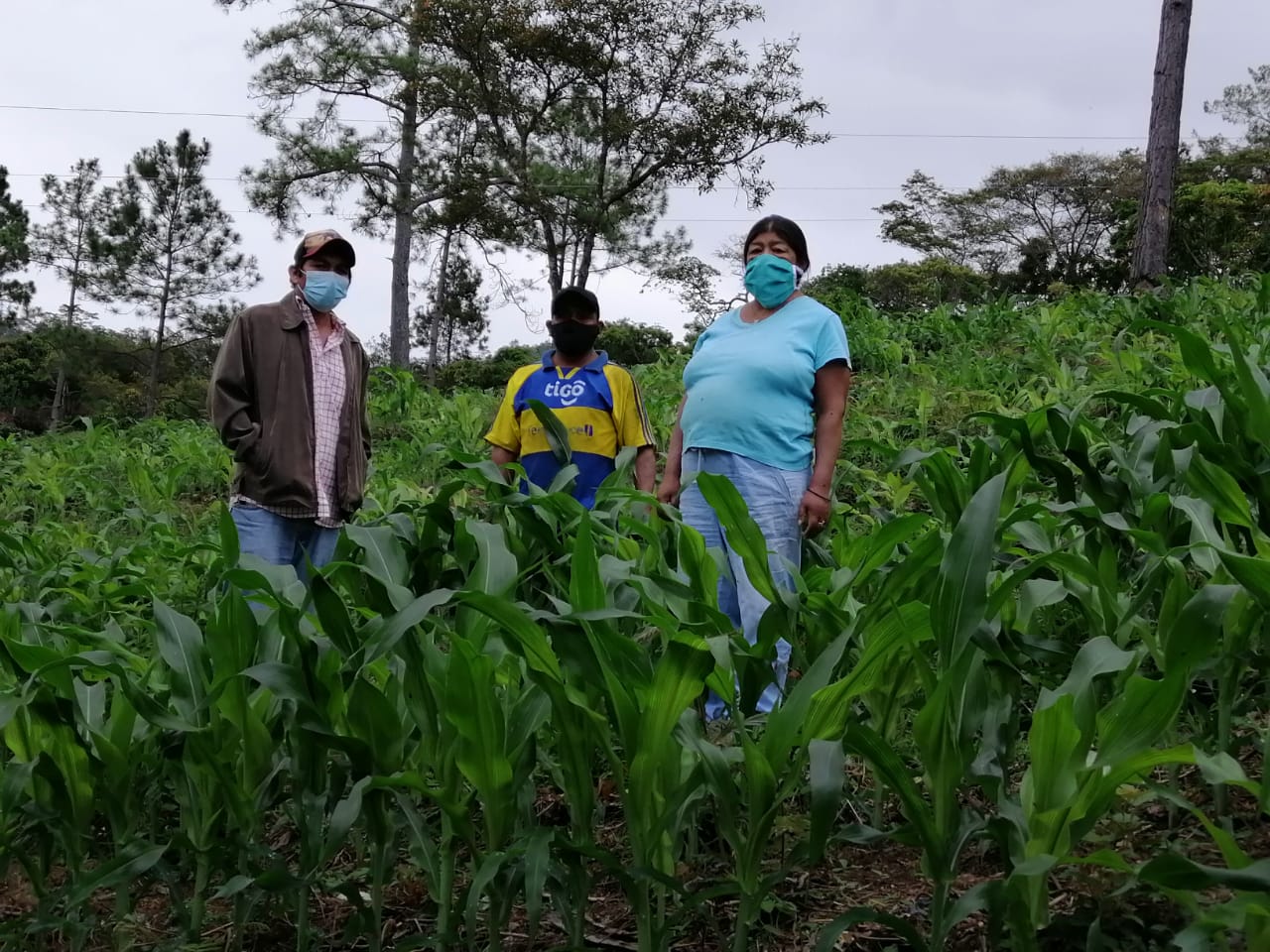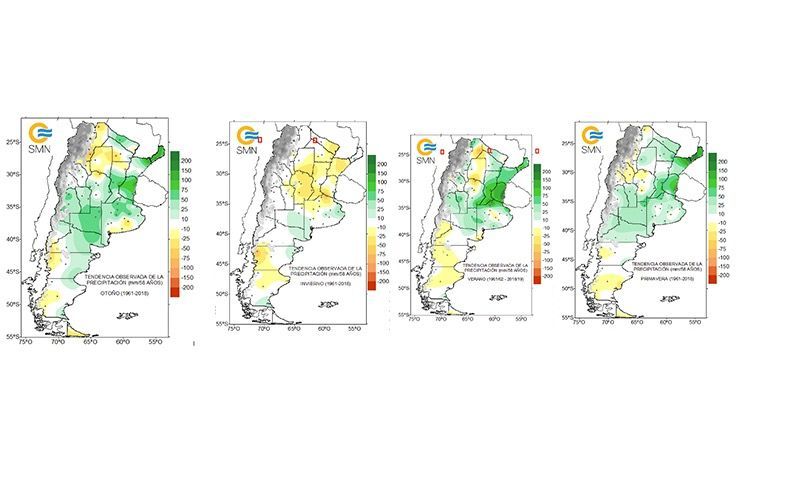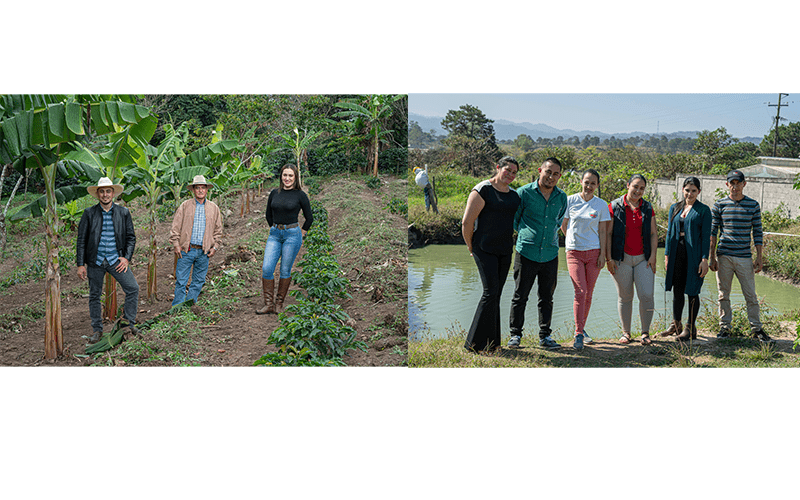3 participants give an account of their experience with this training and its application in real life.
March 1, 2021 - The EUROCLIMA+ Programme has concluded the diploma course Integrating Adaptation to Climate Change (ACC) in Development Planning, delivered by the Tropical Agricultural Research and Higher Education Centre (CATIE), in which 20 participants from 10 Latin American countries took part. The objective, technical capacity building for integrating climate change adaptation into development planning, is reflected in the case studies developed. Three participants reported on their experience.
A total of 20 people, representing different governmental institutions related to the agriculture and livestock or environmental sector in their respective countries, were selected by EUROCLIMA+ to participate in the Diploma Adaptation to Climate Change (ACC) in Development Planning. The Diploma was structured in eight modules - equivalent to 100 academic hours - and was delivered over 13 weeks, from August to December 2020. At the end of the course, participants have acquired technical training on climate change adaptation in the agricultural and natural resources sector, which also contributes to the strengthening of their respective institutions.
Key factors in this success have been the combination of synchronous group sessions, such as webinars - with the participation of experts - and discussion forums, with individual work through the development of a case in which to apply or adapt the ACC Methodology.
Development of practical cases
The diploma is based on the Harvard case methodology, which recognises that adults learn best from their lived experiences. Thus, students have developed concrete assignments around two optional cases: Fictional case of the Federal Republic of Zanadu, a situation based on real-life conditions and challenges, and Real Case, where students developed a real case of their personal interest and developed it by applying or adapting the ACC Methodology.
In general terms, the development of the cases has followed the following script:
- General "real case" information
- Understanding Climate Information
- Projected Climate Change Scenarios
- Interpretation of climate projections
- “real case" Vulnerability Assessment
- Identification of climate change adaptation measures
- Selection of climate change adaptation measures
- Monitoring the Adaptation Strategy
- Institutional Capacity Building
- Conclusions and recommendations
Three participants who developed real cases answer some questions.
Case name: Climate Change Adaptation Plan for the Traslasierra ValleyProject: Resilientes Author: Biol. (Dr.,Mag.) Diego H. Pons, Coordinator PE I064 prevention and evaluation of agricultural emergency and disaster. National Institute of Agricultural Technology (INTA). Objectives: To identify and prioritise climate change adaptation measures for the family farming sector and the environmental management of municipalities in the Traslasierra Valley, departments of San Javier and San Alberto, Córdoba, Argentina. Summary: This plan represents the theoretical guidelines for the implementation of policies, strategies and prioritised actions for adapting to future climate variability scenarios, to be validated and legitimised by the actors involved in the working region, as the starting point for the construction of transformative actions in the territory.
Seasonal trend for the period 1961-2018 of the annual cumulative rainfall in Argentina and the study area. |
EUROCLIMA+: What is your opinion of the diploma?
Diego H. Pons: The diploma course presents clear tools for the identification of vulnerabilities and adaptive capacities of communities, as well as for the design of strategies and prioritisation of actions that promote adaptation to climate change. Its virtual modality has made it possible to learn about the problems and approaches in other regions of South America, enriching the proposal through the contribution of experienced colleagues.
EC+: What is the most valuable learning?
D.P.: The most valuable thing that has remained with me is the integral vision of the methodology applied in a real case, which allows the generation of innovative and pragmatic proposals for the adaptation of communities to climate change, as well as the identification of the roles of government actors, providing elements for the strategic planning of local governments.
EC+ Will you apply this in your day-to-day project work?
D.P.: The diploma course has allowed me to generate a concrete proposal on a particular case of work, which, although it needs validation and adjustments for its implementation, it can be the starting point for the construction of transformative actions for the communities involved. Likewise, this way of working shows potential for application in other territories and problems in which I am involved, such as in the Agrifood Region of Córdoba, with agricultural producers vulnerable to extreme weather events.
|
Case name: Integrating Climate Change Adaptation into the Water Action Plan of the Chiflador-Guaralape sub-basin in the Dry Corridor, in the Department of La Paz, Honduras C.A. Author: José Luis Flores Ochoa, Coordinador del proyecto AFCI-PRA Project: Climate-smart agriculture AFCI-PRA Objective of the case: Integrate Climate Change Adaptation into the water action plan being developed at the level of the Chiflador-Guaralape sub-basin in the framework of project implementation. Euroclima+: What is the most valuable learning acquired? José Luis Flores: It was a successful process; the idea was to learn about different moments on Mainstreaming Climate Change Adaptation and how to put it into practice. EC+ ¿Cuál es el aprendizaje adquirido más valioso? JLF: To have developed a real case study, integrating Climate Change Adaptation in the water action plan of the Chiflador-Guaralape sub-basin, a micro-basin that is being intervened to improve governance processes and therefore sustainable agricultural production, which is an important tool for decision making at the territorial level. Obviously, it is also important to get to know the multicultural process with colleagues from different Latin American countries with conditions very different from ours, especially because climate variability and threats from natural phenomena are very pronounced. The area where I carried out the case, in Honduras, is located in the Central American dry corridor, highly vulnerable to hurricanes, tropical storms and prolonged droughts, which leave disasters in their wake. As we developed the case, I realised that each module contained important learning that will be put into practice in the Chiflador-Guaralape micro-watershed. EC+: Will you apply it in your day-to-day project work? JLF: Clearly yes, as it is an area of work analysis and complementarity with other organisations. As a project, we are working on governance, which encompasses different processes, such as the creation of a micro-watershed council called Chiflador-Guaralape. The case will serve this governance structure, which promotes dialogue between different actors, and which will put into practice many of the actions set out here, which will have a positive impact on the communities and families. |
 |
Integrating Adaptation to Climate Change in the Water Action Plan of the Chiflador-Guaralape sub-basin inserted in the Dry Corridor, in the Department of La Paz, Honduras C.A. Trend for the period 1961-2018 by season of the annual accumulated precipitation in Argentina and study area.
|
Case name: Case study of cattle and sheep farming in Uruguay on natural pasture. Project: Resilient Family Livestock Production Author: Maria Eugenia Carriquiry, Coordinator of the Resilient Family Livestock Project (CNFR /CORPOFAM - INIA), CNFR, Uruguay Summary: This work assessed the vulnerability to climate change of Uruguay's natural countryside and cattle production, and based on this assessment, adaptation measures were identified that could help to reduce this vulnerability. Once the measures were identified, they were evaluated according to criteria of effectiveness, cost, feasibility, legitimacy and equity, and their implementation was then proposed. Once its implementation was proposed, the expected results and effects were identified, as well as the key actors for this implementation. And attached to this process, an institution (in this case a producers' organisation) was selected to propose an institutional strengthening process to improve the organisation's actions in integrating climate change into its work in the short, medium, and long term. |
 |
Case study of cattle and sheep farming in Uruguay on natural pasture
EUROCLIMA+: What is your opinion of the diploma?
Maria Eugenia Carriquiry: I found the course very valuable as a training space. The classes were very good, I found the materials provided very valuable, as well as the exchange with colleagues. The teachers gave feedback on my work at the agreed times, which helped me a lot to think and develop my knowledge.
EC+: What is the most valuable learning?
M.E.C.: The incorporation of a methodology that facilitates/operationalises the integration of climate change into the drafting of rural development projects. Learning about climate change and variability, as well as ways to assess climate vulnerability and risk of productive communities.
EC+: Will you apply it in your day-to-day project work?
M.E.C.: No doubt about it. I now have a better understanding of the RFP project framework, so I am better able to integrate the subject matter into project activities and also into project progress reports.
More information
This email address is being protected from spambots. You need JavaScript enabled to view it.
Subject: Diploma course on Adaptation to Climate Change in the agricultural and livestock sector




